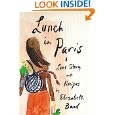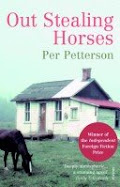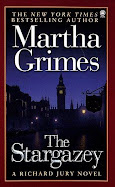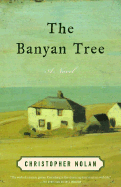I did like this book; this is the first time I’ve read something for discussion in a very long time (college, in fact) so I’m happy to have read Barbara’s, Cinnamon’s, and JGH’s very thought-provoking analyses. I’m afraid mine is just going to be impressions, rather than trying to figure things out.
Time is so very fluid here, and so the central theme of river and the water, and even the fluidity between borders. Where does Norway end and Sweden begin? The characters can’t really tell out in the wilderness. Only at the end, when society and civilization impinge with currency and language as Trond and his mother discover the money his father made is insignificant, is the difference made clear.
This was definitely a man’s/nature’s world. Women were on the edge, or kept out, or marginalized. I was shocked when Trond’s daughter appears suddenly out of nowhere, and he doesn’t immediately recognize her. His wife is killed in a car accident. His sister dies of a disease. This has me thinking more and more about the role of Lars’ mother. At first I saw her also as on the edge, the sexual awakener, the mother. Think of her, riding home all that way not knowing her son had been killed by his twin! But she is very central to the entire book. Without her, nothing would have happened. And yet, we barely know anything about her.
Subscribe to:
Post Comments (Atom)












Hi Tut-tut!
ReplyDeleteThis is great! I hadn't thought about the fluidity of borders before. So that is why he talks about the currency and language at the end. I am definitely going to have to read this again.
And I had not thought about the role of women in the book either. It is true that Jon's mother is central to the story, as you say. Do you think the marginalisation of women is because the story is written through Trond's eyes- a teenage boy- they pretty much take their mums for granted. I felt very sad for Trond's mother who was described as 'heavy' after Trond's father leaves. We do not know much about that marriage either- how they came to grow apart. Other than as a marriage it must have gone through all the tests and trials that most marriages do.
Attitudes, whether towards women or race or creed, tend to be passed down through generations.
I enjoyed reading your comments- I will be thinking on them some more.
Cinnamon: thanks for reading my disjointed commments! Interesting that you say that it is through the teenager's eyes. Is it? Who is really telling the story--Trond from the 67 year old perspective, or is it told from his perspective at whatever juncture he is in the narrative? I found the woman issue fascinating, because we only learn of the wife (wives, actually), sister, etc. very briefly and tangentially. Only Lars' mother is a kind of independent entity, esp. given her work as a resistance fighter, or helper. we don't really know which.
ReplyDeleteI'm sure the land on either side of the border looks much the same. Norway and Sweden are just names given to land that is a continuum. I found it interesting that they seemed to have so much trouble with language in a neighboring country where the language is actually very similar. Today the money would probably not be an issue, because I'm guessing they are both EU countries.
ReplyDeleteAn interesting thought about the role of women, especially the role of Lars' mother, who must have been a very strong woman (in addition to being a passionate woman).
I found it curious that none of the 4 parents has a name in the book. We know them for what they represent, but they are lacking that essential part of an identity.
I keep coming back to this site to find yet another interesting thing to ponder.
Hi Tut! We learned so much about Trond's mother just from that one day they spent together in Sweden, didn't we? I thought her reaction to the news that the sum of money was so small was very telling of her character. The description of Lars' mother was very sketchy as I remember it -- you're so right about the women being marginalized. I'd love to read something by this author that featured women characters - it would be fun to compare.
ReplyDeleteI think Trond's mother was a woman who had had a lifetime of learning how to deal with disappointment. She was probably a much better role model for Trond than his father, whom he clearly adored.
ReplyDeleteHi JGH, tut-tut, Barbara, Cinnamon. JGH and Barbara hit home on lack of description. I like to get a feel for the cast of characters, what they may look like, no matter what their role in the book. This helps me to better "be" a part of the story. We know Jon's( Lar's )mother served in the resistance during the war. But what do we really know about her? We get a better description of the milk-maid.
ReplyDeletePetterson did mention several times the colour of Jon's mother's dress- yellow with blue flowers was it?. I think she was being described through Trond-the-teenagers eyes. Trond the hermit didn't know her at any other time; he was remembering what he saw as a teenager. He would have been embarrassed by his sexual awakenings and perhaps have averted his gaze, stealing glances at her when he could. He would not have been able to describe her in any other terms.
ReplyDeleteHad forgotten about the milk-maid! Another thing to ponder...
Tut Tut,
ReplyDeleteI enjoyed the book very much-- many interesting moments, like when Trond moves to comfort himself and Jon's mother --he thinks about his own mother and thinks how he has only put his arm around his own mother in this way. Then later when his mother takes him to Sweden, the disappointment of the adventure-- the trip to the bank... becomes a coming of age moment when he gets his fine new suit.
I also liked when he talks to the man in his current town, about getting his road ploughed. The man has just lost his father, and the two of them agree that their dads were good men. They don't go into detail, and I like the fact that they don't kvetch about it, but let each other know that they have their private thoughts about their fathers. It's a moment of mutual understanding.
There's plenty of space in the novel-- reminded me of other Norwegian authors, the pacing etc... very nice to have this space and not get all the answers, leaving room to imagine.
I much prefer a novel that allows me to fill in some of the blanks and then to change my impression again and again. It almost customizes the book for the reader, so that my version and yours might not be entirely the same. "Space" is a nice way to put it.
ReplyDeleteSub, will you kick things off tomorrow with something about Martha Grimes posted? I think you know quite a bit about her. I'd forgotten how much I enjoyed Richard Jury.
ReplyDeleteI am so late to this due to the darned flu or whatever it was that laid me low the first part of this week. Still haven't quite recovered but I have enjoyed reading these posts and all the comments!
ReplyDeleteI liked the book very much. Took a few chapters to get used to the writing and after that I simply flew through it. I especially liked the fact that every time it seemed as if more details were going to be revealed (the trip Trond took with his father up into the forest to the old meeting place and the breakfast with Franz, to name just two) the chapter would end and the time would switch again.
Oh my it's getting close to midnight. I might try to write something more about this over the weekend - better late than never? - but we'll see...
Hi Megan- hope you continue to feel better. Definitely better late than never- I have been looking forward to your reading your views but knew you were ill. Also -Leah havn't heard from her yet! I hope she writes something. So more to look forward to!
ReplyDeleteI thought his writing was clever, the way he sneaked in those little surprises. I remember being surprised at what was revealed at the breakfast with Franz.
And the adjustment you needed to the writing- I found that too. It was like landing in another 'country'.
BTW I pick up Stargazey from the library today, so looking foward to seeing how different that will be :)
Megan, sorry to hear you had the flu! You mentioned having to get used to the writing - I know what you mean. For me it's some kind of mental adjustment I have to make when reading something in translation or sometimes when a book is written in English with a dialect. Once the "voice" is established, the reading gets easier.
ReplyDelete